Alexander Kent First Editions (III)
The following Richard and Adam Bolitho novels by Alexander Kent are listed in historical chronological order. Cover images and descriptions are from the dustwrappers of British hardcover first editions.
FORM LINE OF BATTLE!
Hutchinson, 1969
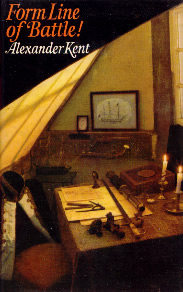 The immediate success on both sides of the Atlantic of Alexander Kent’s first historical novel To Glory We Steer (‘Clearly one of the best stories about wooden-wall action ever written’ — Sunday Times) will ensure an exceptionally warm welcome for this second book. The author’s skill at depicting eighteenth-century naval warfare is again equalled by his outstanding abilities as a storyteller.
The immediate success on both sides of the Atlantic of Alexander Kent’s first historical novel To Glory We Steer (‘Clearly one of the best stories about wooden-wall action ever written’ — Sunday Times) will ensure an exceptionally warm welcome for this second book. The author’s skill at depicting eighteenth-century naval warfare is again equalled by his outstanding abilities as a storyteller.
In June 1793 Captain Richard Bolitho arrives at Gibraltar to take command of the Hyperion, a seventy-four-gun ship of the line. Although not completely recovered from a serious fever contracted in the Great South Sea, Bolitho is eager to get back to duty against the rising might of Revolutionary France. He sails to join Lord Hood to partake in the Monarchist-inspired occupation of Toulon. But at heart Bolitho is still a frigate captain, and he is soon fretting at being tied to the fleet’s apron strings; his ship, too, is old and slow, her hull weed-encrusted after nearly four years’ continuous commission.
Beneath the Mediterranean sun, and often in sight of the enemy coast, Bolitho and his tired old ship face one conflict after another — and when at last the ill-fated campaign collapses in failure it is the Hyperion, outgunned and outnumbered, which takes her rightful place in the line of battle.
ENEMY IN SIGHT!
Hutchinson, 1970
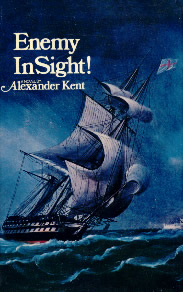 Alexander Kent’s first two historical novels have become international bestsellers. Reviewers have united in their enthusiasm for Captain Richard Bolitho and for his creator, who has been almost unanimously acclaimed as the true successor to C. S. Forester. Enemy in Sight! is the third Bolitho novel — a splendid story of eighteenth-century seamanship and high adventure which will delight the fast-growing army of Kent's readers.
Alexander Kent’s first two historical novels have become international bestsellers. Reviewers have united in their enthusiasm for Captain Richard Bolitho and for his creator, who has been almost unanimously acclaimed as the true successor to C. S. Forester. Enemy in Sight! is the third Bolitho novel — a splendid story of eighteenth-century seamanship and high adventure which will delight the fast-growing army of Kent's readers.
As 1794 draws to a close Richard Bolitho, commanding the old seventy-four-gun ship of the line Hyperion, leaves Plymouth to join a squadron blockading the rising power of Revolutionary France. After six months of repairs his ship is ready to fight again, but her company is mostly raw and untrained.
Unfortunately, Bolitho finds himself under a commodore who is no match for the French admiral, Lequiller, whose powerful squadron uses guile and ruthless determination to elude him and vanish into the Atlantic. Hyperion, as part of a small British force, gives chase, the desperate voyage taking them from the Bay of Biscay’s squall to the heat of the Caribbean — and for each mile sailed and every battle fought Bolitho finds himself being forced into the ever more demanding role of strategist and squadron commander.
THE FLAG CAPTAIN
Hutchinson, 1971
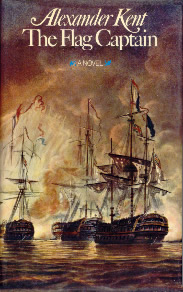 Alexander Kent’s mastery of the sea story and his remarkable feeling for the eighteenth-century navy have made each of his three previous novels an international bestseller. His hero, Captain Richard Bolitho, has been acclaimed as a strong and original character in his own right as well as the only true successor to Hornblower.
Alexander Kent’s mastery of the sea story and his remarkable feeling for the eighteenth-century navy have made each of his three previous novels an international bestseller. His hero, Captain Richard Bolitho, has been acclaimed as a strong and original character in his own right as well as the only true successor to Hornblower.
In the spring of 1797 Richard Bolitho brings the 100-gun Euryalus home to Falmouth to be flagship of the hastily formed squadron which has been chosen to make the first British re-entry to the Mediterranean for nearly a year. As flag captain, Bolitho is made to contend with the unyielding attitudes of his new admiral, as well as the devious requirements of the squadron’s civilian advisor.
England is still stunned by the naval mutiny at Spithead, in which Bolitho’s admiral was personally involved, and as the squadron sets sail the air is already alive with rumour of an even greater uprising in the ships at the Nore. Only when the squadron is drawn to a bloody embrace with the enemy does the admiral see the strength in Bolitho’s trust and care for his men - but by then it is almost too late for any of them.
SIGNAL – CLOSE ACTION!
Hutchinson, 1974
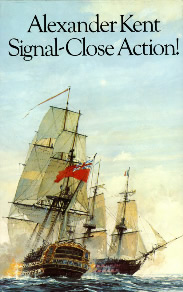 In this, the seventh Richard Bolitho novel, Alexander Kent continues Bolitho’s story following the events described in The Flag Captain. Once again Mr Kent has combined historical authenticity with stirring storytelling of the highest order, and Signal — Close Action! will be enthusiastically welcomed by his ever-growing international readership.
In this, the seventh Richard Bolitho novel, Alexander Kent continues Bolitho’s story following the events described in The Flag Captain. Once again Mr Kent has combined historical authenticity with stirring storytelling of the highest order, and Signal — Close Action! will be enthusiastically welcomed by his ever-growing international readership.
When in 1798 Richard Bolitho hoists his broad pendant as commodore of a small squadron and prepares to re-enter the Mediterranean he is soon made aware of his responsibility. There are rumours of a massive French armada and of the latest type of artillery — and Bolitho’s orders are to seek out the enemy and to discover the intentions of his growing force.
Without any British bases in the Mediterranean, and unable to show favour to old friends, Bolitho is well aware that there are others within his ships who are no less dangerous than the enemy — and during the weeks and months in which the squadron faces the hazards of the weather and French broadsides alike, Bolitho knows that far more than his own future is at stake. A fleet, even a nation, could depend on his decisions and, when he places his squadron between the Nile and the power of France, he must accept the price of the challenge.
THE INSHORE SQUADRON
Hutchinson, 1978
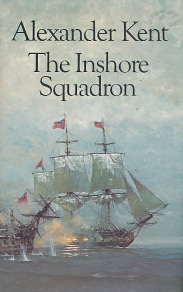 Acclaimed as ‘one of our foremost writers of naval fiction’ (Sunday Times), Alexander Kent has gone from strength to strength since his first Richard Bolitho novel appeared ten years ago. Fine storytelling, careful attention to historical background and sweeping scenes of naval action account for the worldwide success of his books. The Inshore Squadron is the twelfth Richard Bolitho story and chronologically it follows the events covered by Signal — Close Action!
Acclaimed as ‘one of our foremost writers of naval fiction’ (Sunday Times), Alexander Kent has gone from strength to strength since his first Richard Bolitho novel appeared ten years ago. Fine storytelling, careful attention to historical background and sweeping scenes of naval action account for the worldwide success of his books. The Inshore Squadron is the twelfth Richard Bolitho story and chronologically it follows the events covered by Signal — Close Action!
In September 1800 Richard Bolitho, a freshly appointed rear-admiral, assumes command of his own squadron — but, as the cruel demands of war spread from Europe to the Baltic, he soon realizes that his experience, gained in the line of battle, has ill-prepared him for the intricate manoeuvring of power politics.
Under his flag the Inshore Squadron has to ride out the bitter hardship of blockade duty and the swift, deadly encounters with the enemy. An old hatred steps from the past to pose a personal threat to him, but at the gates of Copenhagen, where his flag flies amidst the fury of battle, Bolitho must put all private hopes and fears behind him.
Copyright Highseas Authors Limited
